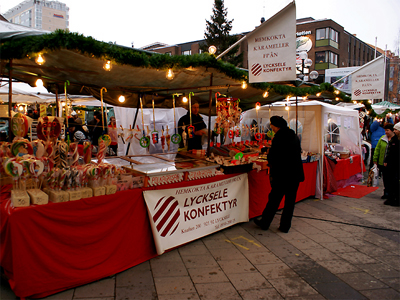Julmarknad and “skriva ihop” Posted by Transparent Language on Dec 16, 2008 in Culture, Grammar, Vocabulary
This year, because I was away, I missed our local julmarknad. No big deal, really, because it’s tiny and not all that interesting (went last year, and the year before, and the year before-before, and so on) and held only during one weekend at our local skansen-type attraction – Gammlia. Yet, the official city hall statistics say that this year over 32 000 people visited the julmarknad. Which means either it was super-fabulous, or simply shows you just how little else is there to do in December.

Taken at least year’s mini-julmarknad downtown.
Anyway, what’s “julmarknad”? A Christmas market, of course.
- jul (def. julen, pl. jular, def. pl. jularna) – en högtid som firar Kristi födelse kring 25 december – Christmas
- marknad (def. marknaden, pl. marknader, def. pl. marknaderna) – ställe där folk samlas för att köpa och sälja saker – market
You add these two words together and end up with “julmarknad.” Easy, isn’t it?
And do you notice how this “double” word is written together, without a space between the compound nouns? Most of those “new” words made by putting together other words are written “together.” Of course, there are exceptions, after all we wouldn’t need to learn any grammar whatsoever if there were no exceptions the rules, right?
So, this rule in Swedish is drilled into kids as “skriva ihop” meaning simply “write together.” Luckily, Swedish is a lot more sensible than German and rarely will you see those massive words than can go on for a whole line of text.
Here are other “written together” words appropriate for the season:
- julafton – Christmas eve, Dec 24.
- julbock – traditional Christmas goat (made out of straw)
- julbord – Christmas buffet
- juldag – Christmas day
- julgran – Christmas tree
- julgransbelysning – Christmas tree lights (this word consists of not two, but three separate nouns: jul+gran+belysning)
- julklapp – Christmas present
- julkort – Christmas card
- jullov – Christmas (school) break
- julmust – traditional Swedish soft drink that people drink during Christmas time, personally can’t stand the thing, tastes a bit like root beer.
- jultomte – Santa Claus
- jultid – Christmas time
And how do you figure out if these nouns are “en” or “ett”? Quite simple. The last word in the compound noun rules. So, “julafton” is an “en” noun, but “julbord” is an “ett” noun.
Oh, and one more thing. Notice that “jul” in Swedish doesn’t have to be capitalized. In English we write “Christmas.” In Swedish, it’s simply “jul.”

Build vocabulary, practice pronunciation, and more with Transparent Language Online. Available anytime, anywhere, on any device.




Comments:
Luke (Sydney):
Tack Ana,now I know why weekdays are not capitalized.
ceci:
hej i cant wait to be in a julmarknad! thank you for your explanation…i must say that even i dont make comments, this is one of my favourites places on the web i look at this usually as i do with vasterbotten kuriren!
kisses anna
ceci
Arsh Jami:
Hej Anna! As Ceci said, even though I do not usually post comments,I always read your blog with real anticipation, every time learning something new about Sverige och Svenska!
This blog about letters case is very informative. I had not seen info on this topic elsewhere so far.
Wish you God jul och gott nytt år! (btw, should `G’in God be capitalized?
Med vänlig hälsning,
Arsh